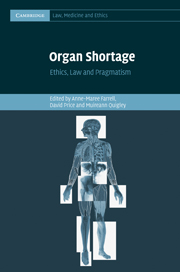Book contents
- Frontmatter
- Contents
- List of figures
- List of tables
- Contributors
- Acknowledgements
- List of abbreviations
- Table of cases
- Table of legislation
- Part I Setting the scene
- 1 A principled and pragmatic approach to organ shortage
- 2 Does ethical controversy cost lives?
- Part II Current issues affecting organ shortage
- Part III Strategies for addressing organ shortage
- Part IV Comparative perspectives
- Part V Current reform and future challenges
- Bibliography
- Index
2 - Does ethical controversy cost lives?
from Part I - Setting the scene
Published online by Cambridge University Press: 29 March 2011
- Frontmatter
- Contents
- List of figures
- List of tables
- Contributors
- Acknowledgements
- List of abbreviations
- Table of cases
- Table of legislation
- Part I Setting the scene
- 1 A principled and pragmatic approach to organ shortage
- 2 Does ethical controversy cost lives?
- Part II Current issues affecting organ shortage
- Part III Strategies for addressing organ shortage
- Part IV Comparative perspectives
- Part V Current reform and future challenges
- Bibliography
- Index
Summary
This chapter was originally conceived in 2006 as the opening address to the seminar series that gave birth to this book. Its purpose was to seek to demonstrate the need for all those involved in debates about the supply of organs for transplantation, to revisit any cherished preconceptions about ethical issues and at the same time focus on practical measures to increase the number of solid organs donated for transplant. The aim of this chapter is to underline both the need for, and the sheer difficulty of, attempting to reach agreement on what kinds of measures might properly be taken to increase the supply of organs when the debates have so often been sharply polarised. As will be apparent, our central focus is on measures that might be implemented in the United Kingdom (UK), but we hope that what we have to say is of some relevance to all jurisdictions.
Controversy about ethical and legal means of obtaining organs for transplant has raged since surgeons first demonstrated that major organs such as kidneys could successfully be transplanted. It is a controversy that embraces several different debates. To list but a few: are donors truly dead? Should payments be allowed for live or deceased ‘donations’? Should ‘presumed consent’ be embodied in the law? Or should all organs from deceased individuals become the ‘property of the state’? Is elective ventilation an abuse of the dying, or a simple process which will save worthwhile lives?
- Type
- Chapter
- Information
- Organ ShortageEthics, Law and Pragmatism, pp. 15 - 34Publisher: Cambridge University PressPrint publication year: 2011
- 1
- Cited by



